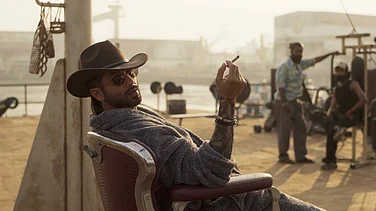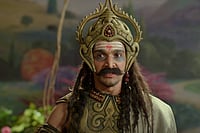Cast: Kriti Sanon, Pankaj Tripathi, Supriya Pathak, Manoj Pahwa, Aiden Whytock, Evelyn Edwards
Director: Laxman Utekar
Rating: **
Cinematographer-director Laxman Utekar’s 'Mimi' is a surrogacy pregnancy drama that starts off as a light hearted saga, but soon takes a significant and uncomfortable look at what can happen when an unexpected medical diagnosis for an unborn child alters the relationship between a surrogate and the child’s parents.
When a childless American couple John (Aiden Whytock) and Summer (Evelyn Edwards) visit Rajasthan in search of a surrogate mother, the rental car driver Bhanu (Pankaj Tripathi) sees them as a source of rich lucre and takes them to the local dancer Mimi (Kriti Sanon), who, he believes would be the perfect choice. After screening many women, the couple too, are convinced that she would be the perfect surrogate mother for their child. After initial hesitation, Mimi doesn’t take too long to be persuaded, and agrees to be their surrogate for a sum of twenty lac rupees. After all, it would help her realise her dream of superstardom in Bollywood. The IVF procedure is successful and Mimi becomes pregnant, and in order to hide the pregnancy from her parents, she lies to them about bagging a film assignment that would keep her away in Mumbai for 9 months. She then leaves home and goes to live with her friend Shama (Sai Tamhankar). Bhanu is part of the gameplan and is asked by John and Summer to take care of Mimi in their absence. But doctors get to know that due to some complications, the child would be born with disabilities. Summer decides to quit and leave India deserting Mimi, who is then left alone with a child in her womb!
Giving away what follows or letting you more into the plot would be a spoiler. Suffice it to say that a theme that was pregnant with a lot more, peters out and a good opportunity is frittered.
Led by good performances, particularly by its lead star Kriti Sanon and the ever dependable Tripathi, the story does probe the heart of a thorny dilemma with sensitivity. What lets you down are clichés and needless scenes propagating amity between Hindu – Muslim relationships, the filmi tried and tested formula of a woman being the ultimate social and cultural notion of motherhood, and associating mothers as valued humans versus worthless non-mothers. On top of it, everybody getting emotional about the child does become unreal. From Mimi’s parents, who understandably develop a bond with him to Mimi’s best friend to Bhanu and even his barren wife, every character sheds copious tears for a child they barely know at the very thought of parting with him looks facetious.
Though there are moments when you do want to invest in the proceedings. Anchored by 'Mimi’s central performance as a woman forced to make a life-changing decision, the film progressively becomes a multi-faceted look at issues surrounding surrogacy. As a result, it fails to capitalize on a promising premise, relying instead on mindless action and a poor script. It also shows legal and emotional perspective of who should the child be with - his surrogate mother who raised him or his mother who has the blood relation with him. Viewers in India would easily identify with the mythological reference to Yashoda and Devki, and will appeal primarily to people who like emotional melodramatic dramas about family planning and family choices.
What works for the 2-hour-13 minute long film is its sporting credibility in spades and managing to consider diverse viewpoints from different perspectives. More than once, it firmly places you in the shoes of its protagonist as she finds herself in a predicament with no easy answers. Regrettably, by the end, the cracks are chasms, the arguments forensically examined, and the decision no easier to make. And so, the narrative gets hindered by its confused track. Nevertheless, after proposing an interesting moral quandary that could have been explored with more depth in a better script, the climax had to be deliberately obliged to suit the Indian taste.
At the end of it, you may want to question yourself? Do movies really sort things out for the viewers in similar situations? Not necessarily always. In fact, they rarely do, even as most Hindi films revolving around issues try to present themselves as real. To be fair, in many films, whenever a number of serious questions that affect the common man are raised, it does make people do a double take. Some, often fail to grasp the significance of a grave problem that they may be faced with, but imagine themselves identifying with such characters while watching the repercussions of a decision unfold on screen.
Notwithstanding its hurried and predetermined end, some viewers might be divided over the movie’s ending, but there’s no denying the impact that this film can have on them, regardless of what kinds of families that people have.
My only grouse is: had this tale been told in a compelling and authentic way, it would have been a winner!


















_adobespark.jpg?w=200&auto=format%2Ccompress&fit=max)
_adobespark_1640955614.jpg?w=200&auto=format%2Ccompress&fit=max)






